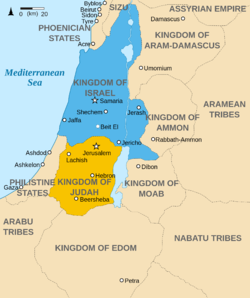Category:House of David (subject)
The House of David ruled over Judea until the beginning of the Second Temple period.
< Timeline (Kings) : Judges -- United Monarchy (1047-930 BCE)-- Kingdoms of Judah and Israel (930-722 BCE) -- Neo-Assyrian Period (722-626 BCE) -- Kingdom of Josiah (626-609 BCE) -- Neo-Egyptian Period (609-605 BCE) -- Neo-Babylonian Period (605-639 BCE) >
Overview
List of Davidic Kings
Rulers of the United Monarchy
Kings of Judah
- Jehoshaphat, son of Asa, King of Judah
- Jehoram, son of Jehoshaphat, King of Judah
Judah was a colony of Samaria (Ahaz walked in the way of the kings of Israel", 2 Kings 16:3)
Took advantage of the fall of the Northern Kingdom to move toward political and religious autonomy. Hezekiah's pro-Egyptian policy provoke the reaction of Sennacherib, king of Assyria, who in 701 invaded the Kingdom of Judah. The city of Lachish was taken and Jerusalem besieged. Hezekiah capitulated, paid the tribute and gave up his dreams of autonomy (see the Annals of Sennacherib). Hezekiah however managed to remain in power.
Was a faithful vassal of Assyria. His reign was the longest of any Judahite king.
Followed the pro-Assyrian policy of his father
Josiah was 8 years old when he began to reign, following the assassination of his father. At the beginning his policy did not differ from tat of his predecessors. After 626 BCE the decline of the Assyrian Empire, challenged by the rising power of the Babylonians, giave more freedom to the kingdom of Judah. in 621 BCE Josiah undertook a serie of political and religious reforms, which radically reshaped the religion of the Jews. The goal was to strengthen the unity of the state by centralizing the cult in Jerusalem. In 609 BCE, however, Josiah was defeated and killed in the Battle of Megiddo by the army of Pharaoh Neco, who was going north in the attempt to help the Assyrians agains the Babylonians. Judah fell under Egyptian control (2 Kings 23:26-30).
Riuled only 3 monthes, before being taken captive to Egypt, where he died.
When he was appointed as a vassal king by the Egyptians, his name was changed from Eliakim to Jehoiakim. The leader of the nationalistic party (Jeremiah and Uriah) were persecuted. In 605 the Egyptians were defeated by the Babylonians in the Battle of Charchemish. Judah was now under Babylonian rule (2 Kings 24:1). In 601 Jehoiakim, supported by the Egyptians, rebelled against the Babylonians. Jerusalem was besieged by the Babylonians
- Jehoiachin (Jeconiah), son of Jehoiakim, King of Judah, 597 BCE
Jehoiachin reigned only 3 months before Jerusalem fell. The king was deported as hostage to Babylonian with his court
Zedekiah also rebelled against the Babylonians. Nebuchadnezzar marched into Judah, captured Jerusalem, demolished the walls of the town, and set the Temple on fire (Jer 39:1-10). Zedekiah was imprisoned, blinded, and his sons were killed before him. A new deportation followed ("832 people", according to Jeremiah 52:29). A new vassal king was not appointed, Now in the Babylonian archives Jehoiachin, although still in captivity, was recognized as the "king of Judah". Gedaliah served as governor as Judah (587-582). His assassination caused a third deportation ("745 people", according to Jer 52:30).
Davidic Kings in exile
- Jehoiachin (Jeconiah), Prince of Judah
In 561 Jehoiachin was released from prison and "a throne was given to him higher than that of the other kings whi were with him in Babylon" (2 Kings 25:27-30)
- Sheshbazzar, son of Jehoiachin, Prince of Judah
- Zerubbabel, nephew of Sheshbazzar, Prince of Judah
Related categories
External links
Pages in category "House of David (subject)"
The following 21 pages are in this category, out of 21 total.
1
- Zerubbabel displays a plan of Jerusalem to Cyrus the Great (c1655 Van Loo), art
- The History of Josiah, the Young King of Judah (1837 Gallaudet), book
- Judith; or, The Regeneration of Manasseh (1888 Parry), oratorio
- Zorobabel et le second temple (1892 Hoonacker), book
- The Gate of the Kiss (1902 Harding), novel
- Die Genealogie des Königs Jojachin und seiner Nachkommen (The Genealogy of King Jehoiachin and His Descendants / 1902 Rothstein), book
- Die Josianische Reform und ihre Voraussetzungen (1926 Bentzen), book
- Siege (1980 Petty), novel
- God Knows (1984 Heller), novel
- Now That Forever Has Ended (1995 Steinbach), novel
- The Reform of King Josiah and the Composition of the Deuteronomistic History (1996 Eynikel), book
- Chronicle of the Old Testament Kings (1999 Rogerson), book
2
- Zemah and Zerubbabel: Messianic Expectations in the Early Postexilic Period (2000 Rose), book
- King Josiah of Judah: The Lost Messiah of Israel (2001 Sweeney), book
- The King and the Cemeteries: Toward a New Understanding of Josiah's Reform (2002 Barrick), book
- King Manasseh and Child Sacrifice (2004 Stavrakopoulou), book
- Gods & Kings (2005 Austin), novel
- Song of Redemption (2005 Austin), novel
- The Strength of His Hand (2005 Austin), novel
- Among the Gods (2006 Austin), novel
- From the Rivers of Babylon to the Highlands of Judah (2006 Japhet), book
Media in category "House of David (subject)"
This category contains only the following file.
- 2005 Edelman.jpg 333 × 500; 71 KB

